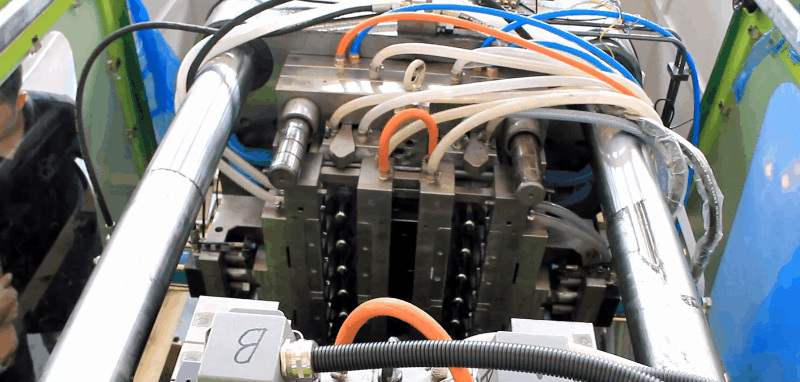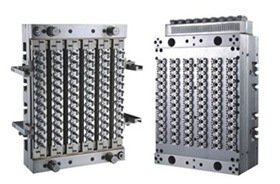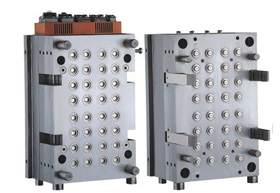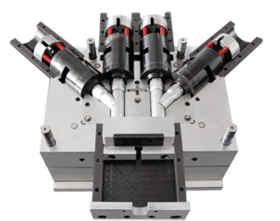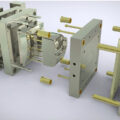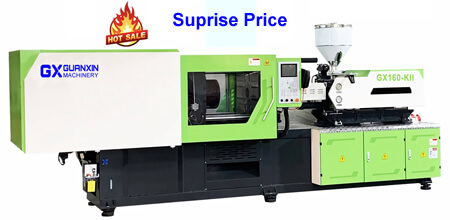Plastic HDPE Injection Molding Process Settings Heating temperature: Barrel temperature feeding zone 30~50°C (50°C) Zone 1 160 ~ 250 ° C (200 ° C) Zone 2 200 ~ 300 ° C (210 ° C) Zone 3 220 ~ 300 ° C (230 ° C) Zone 4 220 ~ 300 ° C (240 ° C) District 5 220 ~ 300 ° C (240 ° C) Nozzle 220 ~ 300 ° C (240 ° C) The temperature in parentheses is recommended as the basic set value, the stroke utilization is 35% and 65%, and the ratio of module flow length to wall thickness is 50:1 to 100:1. Melt temperature: 220 ~ 280 ° C Barrel constant temperature: 220 ° C Mold temperature: 20 ~ 60 ° C Injection pressure: has good flow performance, avoiding excessive injection pressure of 80 ~ 140MPa (800 ~ 1400bar); Except for some thin-walled packaging containers, it can reach 180MPa (1800bar) Holding pressure: high shrinkage, it takes a long time to hold the product, dimensional accuracy is the key factor, about 30% to 60% of the injection pressure
Read more →The injection molding process refers to a process of producing a semi-finished part of a certain shape by pressing, injecting, cooling, and detaching the molten raw material. The injection molding process of plastic parts mainly includes six stages of clamping–filling—gas-assisted, water-assisted pressure-cooling-opening—release. 1. Filling stage Filling is the first step in the entire injection molding cycle, from the time the mold is closed to the injection, until the mold cavity is filled to approximately 95%. In theory, the shorter the filling time, the higher the molding efficiency; but in actual production, the molding time (or injection speed) is subject to many conditions. High speed filling. When the high-speed filling is performed, the shear rate is high, and the plastic has a viscosity drop due to shear thinning, so that the overall flow resistance is lowered; the local viscous heating effect also makes the thickness of the solidified layer thin. Therefore, in the flow control phase, the filling behavior often depends on the volume to be filled. That is, in the flow control stage, due to the high-speed filling, the shear
Read more →Plastic Injection Molding Process Parameters have 5 big parts: Injection Pressure,Injection Time,Injection temperature,Dwell Pressure and Dwell Time, Dwell Pressure and Dwell Time. They are all very important setting for injection molding engineers. 1. Injection Pressure Injection pressure is provided by the hydraulic system of the injection molding system. The pressure of the hydraulic cylinder is transmitted to the plastic melt through the screw of the injection molding machine. Under the pressure push, the plastic melt enters the vertical flow path of the mold through the nozzle of the injection molding machine (also the mainstream channel for some molds), the main flow channel, and the split flow. The process, through the gate into the mold cavity, is the injection molding process, or the filling process. The pressure is present to overcome the resistance during the melt flow, or conversely, the resistance present during the flow process needs to be offset by the pressure of the injection molding machine to ensure a smooth filling process. During the injection molding process, the pressure at the nozzle of the injection molding machine is highest
Read more →Abstract: Optimal design of plastic injection molding parameters are discussed concerning preheating temperature, stove temperature, mold temperature, pressure oil temperature, clamping force, mold filling speed, filling pressure, dwell time, dwell presure, screw speed, pressure reliefback pressure. Norial problems and quality faults in plastic injection are also analyzed in detail. Injection molding refers to an operation process in which a resin is heated and melted, uniformly mixed with other additives, and then injected into a mold to be cooled and solidified to obtain a product having a desired shape. In order to allow the molten material to sufficiently flow into the corners of the mold cavity to obtain a product having a full shape, no wrinkles on the surface, and no voids inside, it is necessary to apply a high pressure to the melt at the time of molding. For a certain plastic parts, when the appropriate plastic varieties, molding methods and equipment are selected, and the reasonable molding process and mold structure are designed, in the production, the selection and control of the process conditions is to ensure the smooth
Read more →What is Polyvinyl Chloride (PVC), and What is it Used For? Polyvinyl Chloride (PVC) is one of the most commonly used thermoplastic polymers in the world (next to only a few more widely used plastics like PET and PP). It is a naturally white and very brittle (prior to the additions of plasticizers) plastic. PVC has been around longer than most plastics having been first synthesized in 1872 and commercially produced by B.F. Goodrich Company in the 1920s. By comparison, many other common plastics were first synthesized and became commercially viable only in the 1940s and 1950s. It is used most commonly in the construction industry but is also used for signs, healthcare applications, and as a fiber for clothing. PVC is produced in two general forms, first as a rigid or unplasticized polymer (RPVC or uPVC), and second as a flexible plastic. Flexible, plasticized or regular PVC is softer and more amenable to bending than uPVC due to the addition of plasticizers like phthalates (e.g. diisononyl phthalate or DINP). Flexible PVC is commonly used in construction as insulation on
Read more →